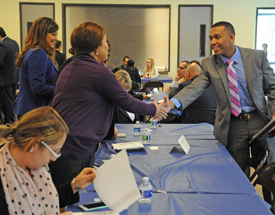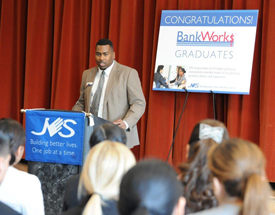The eight-week program focuses on banking industry culture and behavior; soft skills, such as on-time attendance and dress code; and communications skills, such as listening, developing trust, and empathy, which are important in customer interaction. The curriculum also includes information on bank regulations, products and services, and sales and networking techniques. The program is conducted three days a week, enabling residents to work while they participate, and there is no financial cost to participants.

A graduate of the BankWork$ program in Los Angeles meets a bank recruiter at a job fair after a graduation ceremony.
Photo Credit: Ann Bogart, Jewish Vocational Service of Los Angeles.
BankWork$ was launched following discussions between Les Biller, a retired chief operating officer at Wells Fargo Bank, and Jewish Vocational Service (JVS) of Los Angeles, which operates job training programs. In 2006, JVS recruited Lisa Meadows to establish the BankWork$ program and develop the curriculum. She had previously been a senior vice president at Comerica Bank and vice president with Union Bank, and had obtained a teaching credential before starting a banking career.
Meadows, associate director of BankWork$ at JVS, said that a lack of soft skills prevents many people from obtaining positions in banking. Meadows said that many BankWork$ participants "are transformed in their self-confidence as well as in their poise, maturity, and sense of accomplishment." Liudmyla Evans, a graduate of the BankWork$ Seattle program who was hired as a teller and promoted to universal banker in less than a year, recalled: "Mercedes [the instructor] taught us how to build trust, how to be a team player, how to look, and what to do to meet your goals and become successful."
Meadows and four staff members coach, mentor, and instruct participants and continue coaching and mentoring after graduation. Meadows said that participants are "juggling a lot of challenges," such as child care and transportation, and receive assistance with these needs as well as with remedial skills when necessary. JVS prepares participants for job interviews, helps participants obtain proper attire for interviews if necessary, and sometimes refers participants to other job training programs managed by the nonprofit.

After Dominique Satterwhite graduated from BankWork$ in 2013, he was hired by Bank of America as a teller, had two promotions, and is now a personal banker. He had worked as a shift manager in a fast food location before entering the BankWork$ program.
Photo Credit: Ann Bogart, Jewish Vocational Service of Los Angeles.
BankWork$ trains participants for positions as bank tellers, customer service representatives, relationship bankers, and personal bankers, and Meadows points out that program participants have "tremendous opportunities for growth and advancement" in the banks that participate in BankWork$.
Colleen Anderson, executive director of BankWork$ who previously held senior positions at OneWest Bank, Greater Bay Bancorp, and Wells Fargo Bank, said, "We've fused banking industry experience with job training expertise to create opportunities for people from underserved communities."
Origins
In 2006, Biller had a keen interest in vocational training and education. He served on the boards of directors of two nonprofit organizations and wondered whether there might be employment possibilities in banking for young people who were unemployed or underemployed. He was interested in positions that had consistent high demand in many banks, so he contacted other bank leaders and initiated a survey of large banks in Los Angeles that showed a strong annual demand for teller and customer service positions. The Sheri and Les Biller Family Foundation provided initial funding to start BankWork$ as a pilot program with the support of five Los Angeles banks (13 banks currently participate), and JVS used its network of individual, foundation, and government funders.
Biller observed: "One of the critical elements in success is good luck. Someone sees something in an individual and provides an opportunity." BankWork$ strives to "open a door" to employment opportunities for residents who don't know how to start and advance in a career, he said.
Recruitment and Selection
Participants typically learn about BankWork$ from past graduates, bank partners, and the public workforce system. Applicants are given a phone interview and an in-person interview and are asked to write an essay on why they want to be a banker.
Applicants must have at least six months of customer service and sales experience (many have worked in fast food or other retail industries) and must be computer literate. They must have a high school diploma or GED and demonstrate proficiency at a ninth grade reading level and a seventh grade math level.
Applicants must also be bondable at a bank; that is, they must have never been convicted of a crime involving dishonesty or breach of trust, explained a BankWork$ representative.
Replication
BankWork$, which has a three-member staff in Los Angeles responsible for program replication, has an advisory board of senior leaders in the banking and financial services industry.
A local nonprofit vocational training or workforce development partner conducts the eight-week sessions and hosts a graduation and job fair. The same curriculum is delivered in each city, although the classroom instruction has changed to reflect an increased bank focus on sales and service as well as the growth of mobile banking.
BankWork$ was expanded in 2011 to Seattle, where training is delivered by YWCA Seattle King Snohomish. In 2014, BankWork$ received $4 million from Bank of America, U.S. Bank, Wells Fargo Bank, and the Sheri and Les Biller Family Foundation to expand to 12 to 15 cities in five years. The program was subsequently introduced in San Francisco in 2015 and in Phoenix and in Portland, OR, in January 2016. BankWork$ is expanding to Houston, Denver, and Chicago in 2016 and expects to expand to the East Coast by 2017.
In each new location, BanksWork$ signs a licensing agreement for its curriculum materials and training program with a local nonprofit vocational training provider. BankWork$ manages the program's brand and materials, aggregates performance data, and supports program fundraising of local training partners. BankWork$ sets an initial target that program costs will be covered by area banks (40 percent), government agencies (40 percent), and foundations (20 percent). The actual mix of funds varies by location.
Track Record
Of the 2,130 people who started at BankWork$ in Los Angeles, Seattle, San Francisco, and Phoenix, 72 percent completed the program, according to BankWork$ data (Table 1). Of the program graduates, 71 percent were hired by banks. The retention rates for 1,090 program graduates hired by banks are 83 percent at six months and 70 percent at 12 months. Biller and Meadows say that there are better retention rates for BankWork$ graduates than for many other people hired for the same positions.
Program Outcomes as of March 31, 2016 |
|||||
| Day 1 Participants | Number of Graduates | Graduation Rate | Hired by Banks* | Bank Placement Rate | |
|---|---|---|---|---|---|
| All Markets | 2,130 | 1,525 | 72% | 1,090 | 71% |
| Program Outcomes: 2015 | |||||
| Day 1 Participants | Number of Graduates | Graduation Rate | Hired by Banks* | Bank Placement Rate | |
| All Markets | 352 | 258 | 73% | 193 | 75% |
In 1Q2016, the graduation and placement rates are trending higher, with a 74% graduation rate and a 78% placement rate.
*Definition of "hired by banks" is "day 1 successfully completed." An additional 10 percent of graduates are placed in jobs outside the banking industry.
Source: BankWork$
Salaries of BankWork$ graduates vary according to market and starting position. Full-time positions average $30,000 to $35,000 plus benefits, according to BankWork$.
Participants range in age and background and include immigrants and veterans. Of the BankWork$ participants in 2015, 86 percent were from an ethnic minority, 76 percent were female, and 73 percent were between the ages of 18 and 34 years, according to BankWork$.
Of the 2015 graduates who were hired by banks, 64 percent obtained full-time positions and the balance obtained part-time positions, Anderson explained. Many of those who obtained part-time positions had opportunities to advance to full-time positions after they had demonstrated good performance, she said.
Bank Involvement
Area banks provide annual funding to their local nonprofit partner; give presentations to program participants; and attend BankWork$ graduations with family, friends, and program supporters.
Bank recruiters attend graduation ceremonies and meet with graduates in job fairs that take place immediately after graduation.
John Sotoodeh, regional bank executive of Wells Fargo's Southwest region, said that BankWork$ produces "highly trained team members that reflect the community where they live and work and deliver an excellent customer experience. ..." He added: "We have hired well-trained and highly qualified BankWork$ graduates in every one of the markets where the program currently operates, and many of them continue to see their careers progress due in part to the opportunities and experience this program offers."
For more information, contact Colleen Anderson at colleen@bankworks.org; www.bankworks.org.
The views expressed here do not necessarily represent the views of the Federal Reserve Bank of Philadelphia or the Federal Reserve System.

